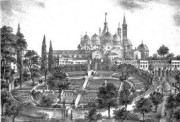 The Origins
The Origins
Niccolò Machiavelli was born in Florence in 1469 AD, third son out of four, after the two sisters Primavera (1465 AD) and Margherita (1468 AD) and before his brother Totto (1475 AD), from Bernardo and Bartolomea. His father Bartolomeo came from an ancient Guelph family of Florence; in his life he worked in the public sector and commerce.
The Studies and Marietta
Niccolò began his studies in Latin, arithmetic and grammar in 1476 AD. Then, browsing his father’s books, became interested in the works of Livio, Cicerone, Macrobio, Plutarco and various other classical writers. Politics started to become a real passion for him in 1497 AD. In 1501 AD he married Marietta Corsini, from whom he had 5 sons, and towards whom he has not been very faithful, cheating on her several times.
The Florentine Political Life
In 1498 AD, Niccolò competed for the place of Second Chancellery’s Secretary of the Florentine Republic, but the job went to a candidate close to Savonarola’s thought (his political opponent). When Savonarola faced his decline, Machiavelli was elected in the Council of Eighty, and later confirmed in the greater Council. The task of his Chancellery, was to liaise with the Ambassadors of the Republic. His many assignments earned him the nickname of “Florentine Secretary”.
Pisa
Florence, at that time, wanted to regain Pisa, which had become independent thanks to the King of France. After a political mediation Pisa and the Casentino were returned to Florence. Niccolò, at the time, wrote a treatise about the war with Pisa, arguing that it was necessary conquering a City in three ways: through a siege, or by starving them, or through the use of artillery, and that the best way was: first, to make a fifty days’ siege, then making concessions to those who wanted to leave the City and then attack. Both in the war against Pisa and the subsequent threat to Florence from the Borgia family, Machiavelli had understood the importance of having France and its king as an ally. Therefore he spent a long time at the French Court, by paying its national army to have their support. Therefore he spent a long time at the French Court, by paying its national army to have their support.
Approaching to Cesare Borgia
Borgia was stopped by the French, but then, it came the time for Machiavelli and Florence to become his ally, essentially to counter the expansionist ambitions of an extremely powerful Venice. The death of Pope Alexander took off Cesare Borgia’s financing, fundamental to keep the Duchy of Romagna, which was dissolved, while Venice was increasing its power, day by day.
Diplomatic Mission In Rome
Pope Julius II° was elected and therefore Machiavelli was sent on a diplomatic mission to Rome for the Conclave, but returned to Florence soon for the birth of her second child.
Diplomatic Mission in Lyon
Meanwhile Spain and France had increased their power and, togheter with the Pope, they began to threaten Florence; it was for that reason that Machiavelli was sent on a diplomatic mission in Lyon in 1504 AD, to ensure to his City the French friendship Back in Florence to form an Army Machiavelli, soon after, began with enthusiasm to recruit militias for creating a real Florentine army and, at the same time, asked the Pope to join his military campaign against Bologna, which was conquered in November 1506 A.
Diplomatic mission in Bolzano
In 1507 AD Machiavelli went to Bolzano ( where he met with the Habsburg Emperor Maximilian I°, determined to beat the French and be crowned in Rome as Emperor of the Holy Roman Empire ) to discuss about the financing of the military campaign. However, since the Venetians defeated Maximilian I° several times, making him desist from any dreams of glory, Florence soon abandoned the idea of funding his military campaign. In this circumstance, Machiavelli had noticed the great German economic and military strength, that was however undermined by the many fears and divisions of his Princes, and it was for this reason he wrote three treatises over the power of Germany. Pisa’s military capture Returned in Florence, Machiavelli continued to recruit soldiers and , eventually, formed the Florentine Militia. In 1509 AD he witnessed the victorious siege of the City of Pisa by its Militia. Diplomatic missions in Verona and in France France, Spain, the Empire and the Papacy joined forces to fight against Venice, which, given the situation, to save himself, had to transfer to them many of his possessions . Florence began initially to finance the League economically, but subsequently, the same seemed to be divided over some goals, and it was precisely that division which allowed Venice to save itself. Machiavelli went first to Verona to finance the Emperor in the war against Venice and then went to France to confirm them the friendship with Florence.
Exile in San Casciano
The Pope meanwhile had allied with Spain, defeating the French of Louis XII°, who fled from Lombardy. The Medici’s family, protected by the Pope, soon returned to Florence and abolished the Republic. The new Pope, Leone X°, belonged to Medici’s family; and having a Florentine Pope, to Florence, meant the end of all fears and dangers. Machiavelli tried to ingratiate the powerful family without success and the adverse political climate around him led him before into prison, where he was also tortured before being released and then towards the exile at his farm, called ” dell’Albegaccio”, located in San Casciano, just outside Florence . In the quiet of the Tuscan countryside Nicolò Machiavelli, divided between a rural life throughout day and an intellectual life during the evening , began to write some books like “Discourses over the first Deca of Tito Livio”, suddenly interrupting them in 1513 AD to write what later became his most important essay: “The Prince”, unnecessarily dedicated to Giuliano and Lorenzo de Medici.
On the way back to Florence
In 1514 AD, Niccolò returned to Florence and sent his famous book also to Vettori, a good friend and ambassador in Rome for Medici’s family, hoping that he could intercede for him with them, to give him a public office, but Pope Leone X° (he too a member of the Medici’s family) did not like Niccolò, because of its previous aversion to the Medicis when he was secretary of the Florentine Republic, so, he did not intervene on Machiavelli behalf. So Niccolò focused his attention over his strongest passion: writing. He frequented the famous Oricellari Gardens (Gardens of the Palace of Cosimo Rucellai), where he met writers and intellectuals. In 1517 AD he wrote some fine poems, including “The Golden Ass”, a beautiful comedy drama, “The Mandrake,” and a short story: ” Belphegor arcidiavolo ” inspired by the negative profits that bind people, all directed to personal gain; and also completed the “Discourses on the first Deca of Tito Livio”.
Sack of Rome; Restoration of the Republic of Florence; Machiavelli’s death
In the following years Niccolò gradually made it up with the Medici’s family , which slowly returned to give him strategic positions, together with Francesco Guicciardini, a Florentine politician. The two, with a League that gathered togheter French and some Italian Lordships, tried to counter the arrival of the Landsknechts of Charles V of Habsburg (king of Spain and Emperor of the Holy Roman Empire), mercenary soldiers of Swiss origin. The two did not achieve their task and the imperial troops conquered Rome and proclaimed again the Florentine Republic: Meanwhile in Florence the Medicis were being banished. The new Florentine Republicans, however, put him aside, because of its rapprochement towards the Medicis, after serving as Secretary of the previous Republic. So Niccolò Machiavelli ended his days left aside, far from the political life of his City, which he loved so much.
The Prince (the book-masterpiece of Machiavelli)
Niccolò Machiavelli had put the story at the center of every political strategy. He had reiterated that history always repeats itself, but man, with his experience and mistakes made in the past, can bend the course of events in his favor. The Prince must be the example for all. In Machiavelli’s thought, the Prince is a strong man, intelligent, very advanced, able to lead his people according to values and strategies designed to protect it and provide it a durable well-being. Although Italy at that time was still divided into Lordships and City-States, Machiavelli had understood, in this treatise, the unitary concept of Nation, as the whole of the Italian populations, put together with the objective to expel the foreign invader with the Prince at the helm. The modern Prince has to be a rational sovereign, chasing consensus, who knows how to strongly maintain under his command the States ruled by him; a man who is both loved and feared at the same time and if he were unable to get both things…better to be feared then; who knows exactly when using the violence of the lion and the cunning and diplomacy of the fox in dealing with his enemies.





